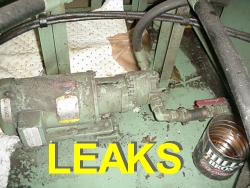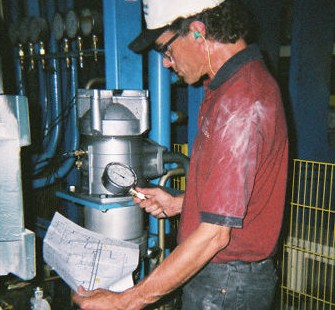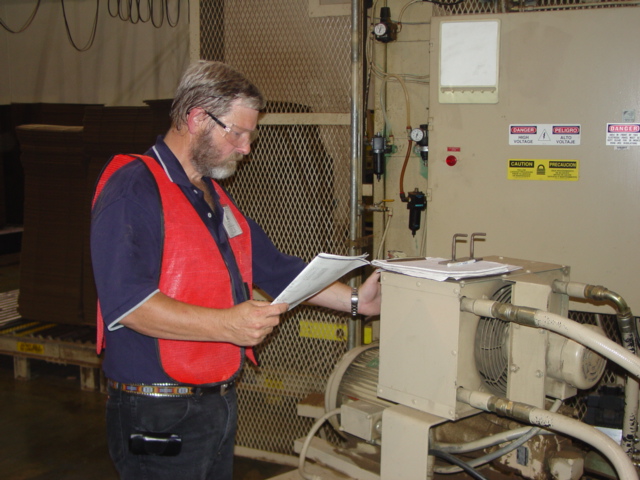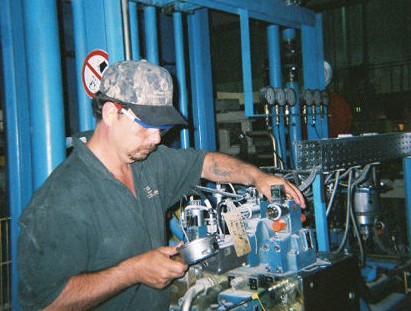
P.O. Box 1376
Monroe, GA 30655
(770) 267-3787
gpm@gpmhydraulic.com
 |
 |
 |
 |
 |
 |
February 2015
For an archive of past newsletters, please visit:
http://www.GPMHydraulic.com/newsletter_archive/
"Troubleshooting Hydraulics" Newsletter
www.gpmhydraulic.com
1. Are Minor Leaks Really A Problem?
2. Call GPM For Emergency Troubleshooting
3. How Safe Is Hydraulic Oil?
4. Is It Time For A Hydraulic Reliability Assessment At Your Plant?
5. Parts Changer or Troubleshooter? Take the Quiz!
6. 2015 Hands-On Public Reliability & Troubleshooting Workshops
 We are often asked if minor leaks are really much of a concern. Repairing them takes valuable time that most maintenance shops feel should be devoted to issues that could halt production. Everyone knows that a ruptured hose needs to be addressed right away. But the mistaken belief that a minor leak doesn't cause a problem is certainly not uncommon. It is even a little surprising how many people seem to believe that hydraulic machines are "supposed to leak a little". We have heard everything from "The oil that bypasses the cylinder seals helps to keep the rods lubricated" to "The leaks in our system help keep our oil fresh since we have to replace so much of it all the time". These same people however would be dissatisfied if their automobile's power steering pump, automatic transmission or brake lines "leaked a little bit". So how much does a minor leak cost? To answer that question, we have to first explore all of the costs involved. Most people think that the only cost is the amount of oil that has to be unnecessarily replaced. But this is not the only cost associated with hydraulic leaks. The actual costs include: Replacement Oil This is the most obvious cost. A drop of hydraulic oil doesn't cost very much even at today's prices. But if your machine loses a drop of oil every second, it adds up. A drop every second will equal about one gallon per day. 30 gallons per month and 365 gallons per year. Depending on your geographic area, the type of oil you use in your machine and the volume you purchase you pay between $6 and $10 per gallon. This means that a leak that loses one drop per second (most machines lose many times that) is costing you between $2190.00 and $3650.00 each year in replacement oil alone. Safety The cost of replacement oil is bad enough but oil leaks pose a safety hazard in almost every facility we have visited. The cost of safety hazards is hard to calculate. But even one incident can cost a few hundred dollars or a few million. Environmental Concerns Not everyone agrees with the Environmental Protection Agency's standards and policies. But we doubt anyone believes that EPA requirements will become more lenient in the near future. If any changes are made in EPA standards, they are likely to include stricter controls and heavier fines and penalties. Currently an uncontained spill of more than one gallon can require EPA notification. Fines in the millions of dollars are not uncommon. Cleanup Costs Often the costs of routine cleanup are ignored, but that doesn't make them go away. Time devoted to cleaning up from a leak is time that could be spent on more productive endeavors and could result in overtime costs that would otherwise not have to be incurred. And we cannot ignore the cost of cleanup equipment, absorbent pads and detergents. Many of these products cost more than the oil they clean up! Annual cleanup costs can easily add $2000 or more to our drop-per-second leak. Disposal Those of us who can remember a time when waste oil companies paid for the privilege of coming to empty our waste hydraulic oil tanks can probably also remember getting change back from a five dollar bill after having someone else fill up our gas tanks, check our oil, check our tire pressure and clean our windshield. These days an environmentally acceptable means of disposing of waste oil can cost $3 per gallon or more. There's another $1100 annual cost to our minor leak. Contamination It's easy to forget that if oil has a way out of the machine, contaminants have a way in. Airborne contaminants, particles and water all can wreak havoc with a hydraulic machine. Over 96% of all hydraulic failures can be directly traced to contaminants in the oil. Not all of those contaminants come from an oil leak of course, but any that we can stop will pay big dividends in parts that do not have to be changed unnecessarily, reduced down time and greater intervals between flushing or changing the oil. Loss of Machine Efficiency A machine that leaks is working harder than it has to. This means that, while the machine appears to be functioning as it should, our energy costs have increased. Suppose our one-drop-per-second leak causes the power bill to increase by five cents per day. That's another $18.25 in annual cost. Not a huge amount, but it could probably buy us dinner somewhere. And it adds up if it occurs in several machines. So assuming that no one gets hurt from slipping on oil and the EPA doesn't have to visit, each drop-per-second leak is costing somewhere between $5000 and $7000 every year. And hydraulic leaks, unlike paper cuts, do not heal. They gradually get worse. At some point, what starts as a "minor" leak can become a machine outage. No leak is so minor that it should be ignored. |

 |
 |
 |
Nothing is more expensive than unscheduled down time. GPM’s customers know they can call whenever they have a troubleshooting issue they simply can’t resolve. With over 100 years' experience dealing with hydraulic failures, our consultants have the resources to help troubleshoot whatever hydraulic problem you encounter. Whether you’re experiencing a total system outage, repeated component failure or need a professionally designed hydraulic reliability assessment, the consultants at GPM can help. Call GPM for:
Do you want to learn more about how GPM can help you? Go to http://gpmhydraulic.com/troubleshooting.php.